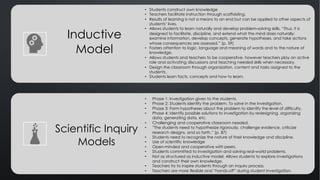Inductive model vs. scientific inquiry models
•
0 likes•6 views
A differentiation between the Inductive Model and Scientific Inquiry Models in the education field.
Report
Share
Report
Share
Download to read offline

Recommended
Javed Iqbal Thesis Defense Presentation

Javed Iqbal Thesis Defense PresentationJaved Iqbal Student of M.S (Teacher Education) at University of Tennessee USA
More Related Content
What's hot
Javed Iqbal Thesis Defense Presentation

Javed Iqbal Thesis Defense PresentationJaved Iqbal Student of M.S (Teacher Education) at University of Tennessee USA
What's hot (20)
Inquiry Based Science Education: How to implement IBSE in your lesson

Inquiry Based Science Education: How to implement IBSE in your lesson
Activity based approach of learning mathematics-Thiyagu

Activity based approach of learning mathematics-Thiyagu
Science Education Module 3 for B.Ed. Students and Science Teachers

Science Education Module 3 for B.Ed. Students and Science Teachers
Similar to Inductive model vs. scientific inquiry models
Similar to Inductive model vs. scientific inquiry models (20)
modelsofteaching-120122073945-phpapp01-140222111541-phpapp02.pdf

modelsofteaching-120122073945-phpapp01-140222111541-phpapp02.pdf
Some Ideas about effective teaching and assessment

Some Ideas about effective teaching and assessment
Recently uploaded
“Oh GOSH! Reflecting on Hackteria's Collaborative Practices in a Global Do-It...

“Oh GOSH! Reflecting on Hackteria's Collaborative Practices in a Global Do-It...Marc Dusseiller Dusjagr
Recently uploaded (20)
A Critique of the Proposed National Education Policy Reform

A Critique of the Proposed National Education Policy Reform
TataKelola dan KamSiber Kecerdasan Buatan v022.pdf

TataKelola dan KamSiber Kecerdasan Buatan v022.pdf
Science 7 - LAND and SEA BREEZE and its Characteristics

Science 7 - LAND and SEA BREEZE and its Characteristics
Introduction to ArtificiaI Intelligence in Higher Education

Introduction to ArtificiaI Intelligence in Higher Education
“Oh GOSH! Reflecting on Hackteria's Collaborative Practices in a Global Do-It...

“Oh GOSH! Reflecting on Hackteria's Collaborative Practices in a Global Do-It...
Kisan Call Centre - To harness potential of ICT in Agriculture by answer farm...

Kisan Call Centre - To harness potential of ICT in Agriculture by answer farm...
Inductive model vs. scientific inquiry models
- 1. Inductive Model Scientific Inquiry Models • Students construct own knowledge • Teachers facilitate instruction through scaffolding. • Results of learning is not a means to an end but can be applied to other aspects of students’ lives. • Allows students to learn naturally and develop problem-solving skills. “Thus, it is designed to facilitate, discipline, and extend what the mind does naturally: examine information, develop concepts, generate hypotheses, and take actions whose consequences are assessed.” (p. 59) • Fosters attention to logic, language and meaning of words and to the nature of knowledge. • Allows students and teachers to be cooperative, however teachers play an active role and activating discussions and teaching needed skills when necessary. • Design the classroom through organization, content and tasks assigned to the students. • Students learn facts, concepts and how to learn. • Phase 1: Investigation given to the students. • Phase 2: Students identify the problem. To solve in the investigation. • Phase 3: Form hypotheses about the problem to identify the level of difficulty. • Phase 4: Identify possible solutions to investigation by redesigning, organizing data, generating data, etc. • Challenging and cooperative classroom needed. • ”The students need to hypothesize rigorously, challenge evidence, criticize research designs, and so forth.” (p. 87) • Students need to recognize the nature of their knowledge and discipline. • Use of scientific knowledge • Open-minded and cooperative with peers. • Students committed to investigation and solving real-world problems. • Not as structured as inductive model. Allows students to explore investigations and construct their own knowledge. • Teachers try to inspire students through an inquiry process. • Teachers are more flexible and “hands-off” during student investigation.